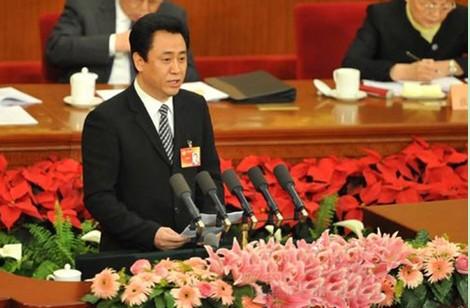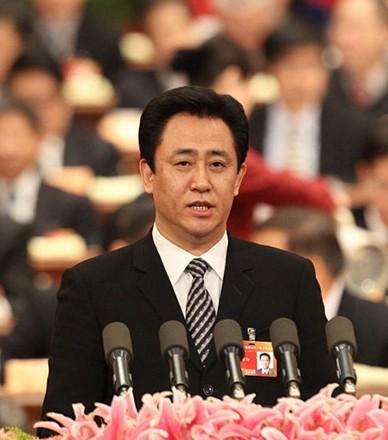
The Third Plenary Session of the Eleventh Chinese People s Political Consultative Conference was held at 9:00 on March 9 at the Great Hall of the people, at which Xu Jiayin, Chairman of Evergrande Group, delivered a speech entitled Stimulate enterprises enthusiasm and promote the development of charities as the sole representative of Chinese enterprises.

Xu Jiayin s speech is as follows:
In recent years, China's charities continue to develop. All sectors of society actively participate in social charitable donations, from which nearly one hundred million people have already benefited. However, our charitable need is so huge that there are more than 150 million people needing help every year.
If charity is like a well of 100 meters deep, we have only dug a few meters. Over the years, we have summed up the experience from examples of our own and other enterprises in charitable relief and we found that it is an urgent need to stimulate the enterprises participation enthusiasm to further promote the development of charities.
I. Analysis of problems in enterprises participation in charities
1. The overall environment is to be improved
At present, there are thousands of million of enterprises in China, but there are only a few dozens of enterprises which have donated, which means that most of the enterprises haven t made donations. In addition, some pioneer enterprises keen for charities are subject to administrative pressure of fund raising, which directly impedes their enthusiasm of another donation.
2.Policies and regulations and incentives need to be improved
The development of charities needs the guarantee and promotion by policies and regulations. At present, the existing policies and regulations on China's charity system are imperfect with less operability. In addition, there is a lack of complete incentive measures. Some charitable organizations have defects in organizational structure and rules and regulations, decreasing their credibility and enterprises enthusiasm for participation.
3.Participatory approach is limited and the evaluated effect is comparatively poor
China Charity Development Report shows that in the first half of 2009 Chinese enterprises of all types had donated 5.457 billion yuan, accounting for 60.3% of total amount of exterior donated funds and goods, but the donation is mainly properties. Common foreign donation of capital, technology, products, equipment, knowledge, and skills are rare, and only 11% enterprises evaluate the effect.
II. Advices on further encouraging enterprises to participate in charities
1. One focus is to create a healthy charity culture
Charity does not just mean money. It is the calling of mind, a lofty mankind culture. At the present stage, we should continue to optimize the social environment to ensure the autonomy of corporate donation, to enhance the propaganda on charity, and to establish a healthy, well-charitable and cultural atmosphere, so as to attract more enterprises to participate in charities.
2.To build and improve the legal system
The development of charities requires appropriate legal and institutional breakthrough. On one hand, we must improve the existing laws and regulations. For example, the Public Welfare Donation Law should further clarify the qualifications and duties of recipients and donors and explicitly specify the competent authorities of donation activities, so as to enhance the operability. On the other hand, we hope that the Charities Act could be passed, promulgated, and implemented as soon as possible to specify the nature, mission, and basic principles of management and operation of charitable organizations, to prescribe the relationship between government supervision authorities and charitable organizations, and to create a sound legal environment for enterprises participate in charities.
3.To optimize a mechanism for encouraging donation through three measures
Though charity is free, it will definitely stimulate the enterprises initiative to participate in charities if the donors are all rewarded. We believe that it is important to establish a taxation system integrated with encouragement for charitable donation. There are three specific measures: Firstly, to implement the Generalized System of Preference under which one can enjoy tax preference so long as he/she makes donation to any legitimate charitable organization, thus increasing the overall amount of donation.
Secondly, to establish convenient, quick, and user-friendly tax-free procedures. Thirdly, to consider imposing inheritance tax and gift tax and increasing luxury tax to guide rich entrepreneurs to turn some funds to the social welfare services.
4.To enhance supervision and management of donations in four aspects
After the earthquake in Wenchuan, an enterprise directly distributed money to the victims instead of through charitable organizations, which deserves our reflection. It is recommended to strengthen the supervision and management of charitable organizations in the following four aspects:
Firstly, to improve external supervision authorities: Including competent authorities directing and supervising charitable organizations to carry out activities in accordance with the law and by statute, financial, taxation, auditing authorities conducting administrative supervision, and supervision through social opinion by civil evaluation organizations and individual citizens in accordance with laws.
Secondly, to establish and improve an internal self-discipline mechanism inside charitable organizations. We shall establish standards and rules to control interior members. Charitable organization should be managed by high-level professionals, and there should be strict procedures for application and allocation of relief and budget and write-off of operation expenses.
Thirdly, to establish a compulsory information disclosure mechanism. In the process, six aspects should be made public: the amount of donation, the details of donation, the recipient, the process of relief, the amount of relief, and the results of relief.
Fourthly, we should earnestly strengthen the capacity-building of charitable organizations such as resources development, social mobilization, and efficient relief. We should also improve a series of polices to promote the healthy growth of quality charitable organizations.
Related News
- As the Exclusive Sponsor of 23rd Asian Cup Table Tennis Tournament, Evergrande Supports Guangzhou Sports Undertakings with Great Strength
- Evergrande Convenes the Regional Company Strategic Partnership Meeting
- Evergrande Won an Easy Victory over BIT at 3:1 in the First Game
- CCP Huaian Committee Leaders Met with President Xia Haijun
Photos
More>>trade
- Chen Quanguo, Governor of Hebei Province, Met with Xu Jiayin, indicating
- Secretary of Hubei Provincial Party Committee and Governor Visit Evergrande
- Guangzhou Evergrande Automobile Team successfully won the halfway champion
- Chairman Xu Jiayin Visited Sanya
- Memo of Press on Sales Performance of Evergrande in May 2010
market
- New Home Association of Hong Kong was Established and Xu Jiayin was Appointed as
- Brazilian Cheetah Joining Evergrande Football Club
- Chairman Xu Speaking on the Starting Ceremony of Guangdong Poverty Reduction Day
- Evergrande s Midyear Working Conference was Successfully Held
- Grand foundation stone laying ceremony of Evergrande Oasis in Lanzhou
finance
- Chairman Xu requiring the club to be most in three aspects
- Guangzhou Evergrande Team Tied Chengdu Sheffield United Team at 2:2
- Jinan Party and Government Leaders Visiting Evergrande and High Praising Its
- Guangzhou Evergrande Team Overwhelming Anhui Jiufang Team at 4:0
- Interim results released by Evergrande in Hong Kong showing sharp increase in





